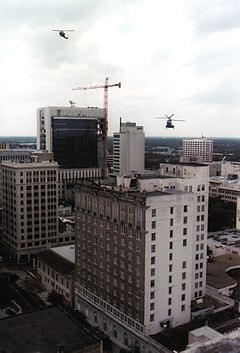Hotel Roosevelt fire

The Hotel Roosevelt (in the foreground), in a 2001 Navy photograph.
|
|
| Date | December 29, 1963 |
|---|---|
| Location | Jacksonville, Florida |
| Type | Fire |
| Cause | Faulty wires |
| Deaths | 22 |
The Hotel Roosevelt fire, on December 29, 1963, was the worst fire that Jacksonville, Florida, had seen since the Great Fire of 1901, and it contributed to the worst one-day death toll in the city's history: 22 people died, mostly from carbon-monoxide poisoning.
At the time, the Hotel Roosevelt was one of two luxury hotels in the city's downtown, with many restaurants and businesses on its ground floor, including a ballroom and a barber shop. At the end of each year, the Hotel Roosevelt hosted hundreds of travelers who came to attend the Gator Bowl.
The fire started in the ballroom's ceiling. The old ceiling, which was deemed a fire hazard, was not removed when the new ceiling was installed, providing kindling for the fire, which started from faulty wires.
The first calls to the Jacksonville Fire Department were made at 7:30am by Alton Crowden, Sr.. Smoke was traveling throughout the 13-story building, and hotel visitors climbed out of the smoky building with the help of other patrons and bedsheets tied together. Mayor W. Haydon Burns immediately called for assistance from the U.S. Navy, and eight helicopters were flown to downtown from Cecil Field and NAS Jacksonville. The airmen helped the patrons out of the building, and transported them to a nearby parking lot, where ambulances were already waiting.
The fire was extinguished by 9:30 a.m., and it was estimated that nearly 475 people were saved from the burning building. After a day of recovering the dead, firefighters found 21 residents dead in their beds from smoke inhalation. In addition, assistant chief J.R. Romedy collapsed of a heart attack during the initial rescue efforts, and died at the scene.
One of those who survived the fire was 1964 Miss America Donna Axum.
...
Wikipedia
